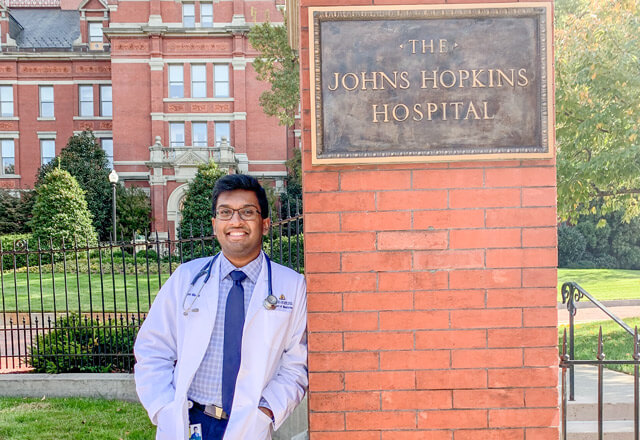Student Profile: Arjun Menta, Physician-Innovator in Training

When Arjun Menta, a medical student at the Johns Hopkins University School of Medicine, sees a problem, his first instinct is to solve it. His goal is to become a physician-innovator—a mix of clinician, researcher, inventor, and entrepreneur who uses his insights from the clinic to develop technology that improves patient care on a macro scale.
Arjun arrived at the School of Medicine in 2021 with several patents and companies already to his name. While completing a double-major in biochemistry and business honors at University of Texas at Austin, he patented a novel thermoelectric cooler called Vaxcube to aid in global vaccine transportation. He also co-invented Fruitbyte, a farming analytics and automation platform that began as an algorithm to test chest X-rays with multispectral imaging. The project ran into data acquisition issues, but Arjun and his team saw an opportunity to pivot to agriculture. “Just as radiologists can use imaging to look at humans, you can actually do the same thing with plants to see if they’re healthy,” Arjun explained. They learned that plants develop temperature gradients when water stressed, which can be picked up by multispectral imaging. Spending their days working with farmers, the team built a device using a rope-pulley system—similar to Skycam systems in stadiums—to monitor crops. “The experience taught me how to pivot and tackle problems in a field I knew very little about,” Arjun said.
At Hopkins, Arjun has been working with physician-innovators in the Department of Neurosurgery like Dr. Nicholas Theodore, the director of the Neurosurgical Spine Center who co-invented an image-guided robot to perform more precise spine stabilization surgeries. Working with the Department of Neurosurgery has provided Arjun with invaluable mentorship and the opportunity to partner on inventions. “It’s a great opportunity because they have extensive clinical expertise that I can learn from and I can apply my engineering and entrepreneurial skills to perform research, build prototypes, raise funding, and do testing, which is really exciting,” said Arjun. “These are all inspired by things I’m seeing in the clinic and OR when working with them.” Ventrisense, one device Arjun is working on, is being developed to assist in the treatment of patients with a brain bleed. Clinical trials will soon begin at the Austin Medical Center at the University of Texas at Austin where Arjun first began work on Ventrisense.
Arjun is a first-generation American, the child of engineers who emigrated from India. He was amazed by his parents’ resourcefulness—if something around the house needed fixing, they would find a way to fix it themselves and do it well. When Arjun’s father felt he and his brother weren’t receiving a well-rounded education, he began teaching them himself with additional after-school lessons. “My parents weren’t going to wait for anybody,” Arjun said. “They always fostered in us a strong sense of curiosity, of trying to understand and fix problems, ideally not just for ourselves but to serve others as well.”
Physician-innovators use their skillset to develop technology with the potential to treat patients beyond their own lifetimes. This potential to make a lasting impact inspired Arjun to pursue medicine. Now in his third year of medical school, Arjun shared how the financial support he’s received, including the Paul and Daisy Soros Fellowship for New Americans, and Hopkins scholarship support from the Class of 1966 Scholarship Fund and the Leonard L. Greif Memorial Scholarship Fund, has provided him with the financial freedom to pursue his unique career path. “The support is exceptionally meaningful,” Arjun said. “Having the financial burden lifted gives me freedom. I can really pursue my interests in research and innovation. It’s a privilege.”
So, what kind of physician-innovator does Arjun want to be? “We have a lot of physician-innovators at Hopkins, and they live very different lives,” he said. “Some are heavily clinical, some are fifty-fifty, and some have left clinical completely. Personally, I want to treat patients, but I’m exploring as many pathways as I can before making that decision.” His time working with the Department of Neurosurgery under the mentorship of successfully physician-innovators like Dr. Theodore has inspired him. However, he wants to get through his rotations before settling on a specialty. “Ultimately, I think medicine is all about time—our most valuable commodity. Giving people as much time as they can, and the best quality of time is where we as physicians make the largest impact.”
